新概念英语语法
新概念英语的语法体系
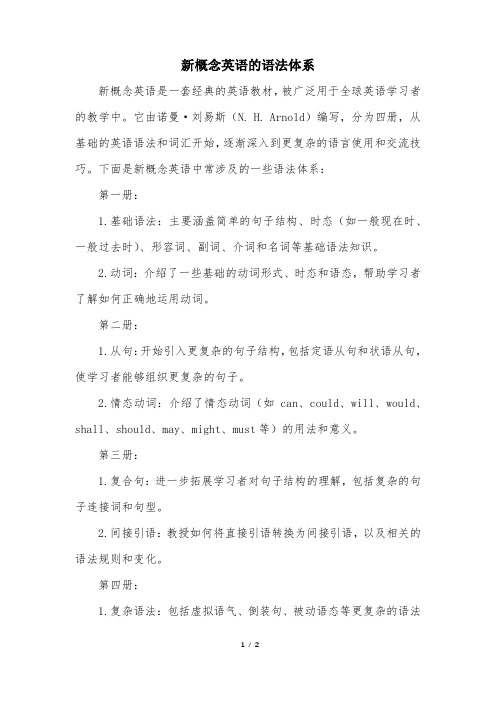
新概念英语的语法体系
新概念英语是一套经典的英语教材,被广泛用于全球英语学习者的教学中。
它由诺曼·刘易斯(N.(H.(Arnold)编写,分为四册,从基础的英语语法和词汇开始,逐渐深入到更复杂的语言使用和交流技巧。
下面是新概念英语中常涉及的一些语法体系:
第一册:
1.基础语法:主要涵盖简单的句子结构、时态 如一般现在时、一般过去时)、形容词、副词、介词和名词等基础语法知识。
2.动词:介绍了一些基础的动词形式、时态和语态,帮助学习者了解如何正确地运用动词。
第二册:
1.从句:开始引入更复杂的句子结构,包括定语从句和状语从句,使学习者能够组织更复杂的句子。
2.情态动词:介绍了情态动词 如can、could、will、would、shall、should、may、might、must等)的用法和意义。
第三册:
1.复合句:进一步拓展学习者对句子结构的理解,包括复杂的句子连接词和句型。
2.间接引语:教授如何将直接引语转换为间接引语,以及相关的语法规则和变化。
第四册:
1.复杂语法:包括虚拟语气、倒装句、被动语态等更复杂的语法
1/ 2
结构和句型。
2.词汇拓展:这一册更侧重于词汇量的扩展和更高级别的语言运用,帮助学习者提升语言表达的广度和深度。
新概念英语的特点之一是通过逐步引入语法知识,让学习者逐渐掌握并应用英语的基础结构。
每册都有一系列的练习和例句,帮助巩固所学内容,并提供了听力材料帮助学生提高听力水平。
2/ 2。
新概念一语法知识汇总

新概念一的语法知识主要包括以下几个方面:
限定词:如some、any、many、much等,用于修饰名词或代词,表示数量或程度的不同。
名词:名词分为可数名词和不可数名词,可数名词有单数和复数形式,不可数名词没有复数形式。
时态变化:包括一般现在时、一般过去时、现在进行时、过去进行时、一般将来时和过去将来时等。
人称变化:根据句意和语境,改变主语和谓语的人称形式。
倒装句:将谓语动词或整个句子放在主语之前,表示强调或按照一定的语法规则进行倒装。
疑问句和否定句:疑问句是将谓语动词提前,否定句是在谓语动词前加上否定词not或don't等。
直接宾语和间接宾语:直接宾语是及物动词的直接对象,间接宾语是及物动词的动作所涉及的人或事务。
介词短语:介词短语是由介词和名词或代词组成的短语,表示某物或某人在某处、某时间的状态或位置。
冠词:冠词用于限定名词,包括不定冠词a/an和定冠词the。
代词:代词用于代替名词或名词短语,避免重复,常见的代词有I、you、he、she、it、they等。
形容词和副词:形容词用于描述名词或代词的特征或属性,副词用于描述动词、形容词或其他副词的形态或程度。
以上是新概念一的主要语法知识汇总,通过学习这些知识,可以帮助学生更好地理解英语的基本结构和表达方式,提高英语水平。
新概念英语第一册课语法点总结
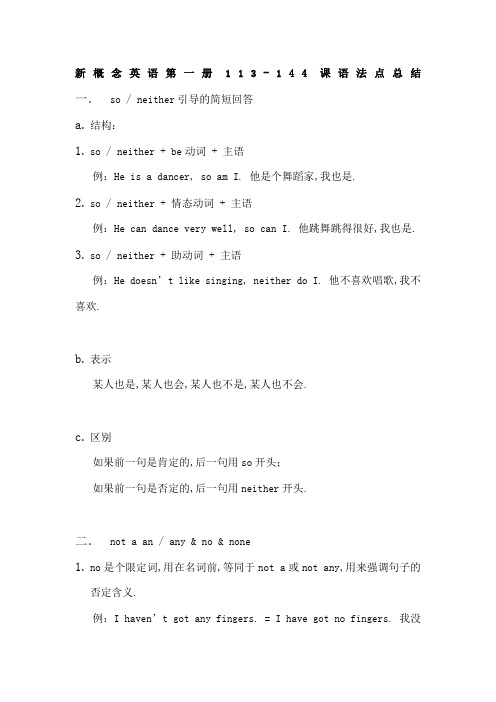
新概念英语第一册113-144课语法点总结一.so / neither引导的简短回答a.结构:1.so / neither + be动词 + 主语例:He is a dancer, so am I. 他是个舞蹈家,我也是.2.so / neither + 情态动词 + 主语例:He can dance very well, so can I. 他跳舞跳得很好,我也是.3.so / neither + 助动词 + 主语例:He doesn’t like singing, neither do I. 他不喜欢唱歌,我不喜欢.b.表示某人也是,某人也会,某人也不是,某人也不会.c.区别如果前一句是肯定的,后一句用so开头;如果前一句是否定的,后一句用neither开头.二.not a an / any & no & none1.no是个限定词,用在名词前,等同于not a或not any,用来强调句子的否定含义.例:I haven’t got any fingers. = I have got no fingers. 我没有手指.I haven’t got a long tail. = I have got no long tail. 我没有一条长尾巴.2.none : 没有人;一个也没有;一点儿也没有例:He has got many interesting books. I have got none.他有很多有趣的书,我一本也没有.三.不定代词either; both; all; neither; none两者两者以上肯定都……both all否定都不……neither none注意:either表示两者任选其一.例:Which one do you want, an apple or a pear Either is Okay.你想要苹果还是梨都可以.Either of my parents will come to see you. 我爸爸或者妈妈会来见你.不定代词的词组:1.both … and …两者都……例:Both Lily and Linda are right. Lily和Linda都是对的.注意:both … and …连接名词或代词作主语时,谓语动词用复数形式.2.neither … nor …既不…也不…例:Neither Lily nor Linda is right. Lily和Linda都不对.注意:neither … nor …可连接任意两个并列的成分,其谓语动词遵循“就近原则”.例:Neither he nor I am right. 或 Neither I nor he is right. 我也不对,他也不对.3.either … or …或者…或者…例:Either Lily or Linda is right. 要么Lily是对的,要么Linda 是对的.注意:either … or …连接句子中两个并列成分,其谓语动词遵循“就近原则”.例:Either he or I am right. 或 Either I or he is right. 要么我是对的,要么他是对的.四.复合不定代词、复合副词一复合不定代词1.定义由some-, any-, no-, every- 加上-one, -body, -thing等组成的不定代词.something某事somebody某人someone某人anything任何事anybody任何人、某人anyone任何人、某人2. 注意除no one中间有空格外,其余复合不定代词均需要连写,中间不允许有空格.注意nothing 的读法.二复合副词1. 定义由some-, any-, no-, every- 加上-where 所组成的是表示地点的副词.三复合不定代词、副词的用法1. 复合不定代词作主语时,谓语动词用三单形式.例:Someone is looking for you. 有人在找你.2. 复合不定代词、副词置于形容词或不定式之前例:nothing impossible 没有不可能的事 somewhere interesting 有趣的地方something to eat 吃的东西3.由some-复合的不定代词、副词用于疑问句及否定句中,要变为由any-复合的不定代词、副词例:肯定句:He told us something useful. 他跟我们说了一些有用的话.否定句:He didn’t tell us anything useful. 他什么有用的话都没跟我们说.疑问句:Did he tell you anything useful 他跟你们说了什么有用的话吗注意:当表示请求或建议时,由some-复合的不定代词、副词可以用在疑问句中例:Would you like something to eat 你想吃点什么吗4.带有no-的复合不定代词、副词相当于“not + any-复合的不定代词、副词”nothing = not anythingno one = not anyonenobody = not anybodynowhere = not anywhere例:I saw nothing in the room. ====== I didn’t see anything in the room.我在屋子里什么都没看见The tramps have got nowhere to live. ====== The trampshaven’t got anywhere to live.流浪汉们无处可住.五.过去进行时1.构成肯定句:主语 + was / were + doing例:I was walking the pig at six yesterday evening. 我昨天晚上六点钟在遛猪.否定句:主语 + was not / were not + doing was not = wasn’t; were not = weren’t例:I was not walking the pig at six yesterday evening. 我昨天晚上六点钟没有在遛猪.一般疑问句:Was / Were + 主语 + doing例:Were you walking the pig at six yesterday evening 你昨天晚上六点钟遛猪吗2.含义表示在过去一个精确的时间或时间段正在发生的动作.简称:过去的精确3.标志词at + 时刻 + 过去的时间; at this time + 过去的时间…….4.when的用法六.瞬间动词与延续性动词1.定义瞬间动词:这类动词所表示的动作在瞬间就可以完成,不能延续下去,即动作从开始到结束所持续的时间极短.延续性动词:这类动词所表示的动作能够延续下去或产生持久的影响.2.用法瞬间动词的进行时形式不表示这个动作“正在进行”,而是表示“动作即将发生”.例:She is leaving. 她马上就要走了.3.when PK while 当……的时候when后面可以接瞬间动词,也可以接延续性动词,但多接瞬间动词;while后面通常只接延续性的动词.例:Sarah was sleeping when the thief came in. 当Sarah正在睡觉的时候,小偷进来了.Sarah was dancing while her sister was singing.当Sarah正在跳舞的时候,她的姐姐正在唱歌.注:过去完成时,定语从句,宾语从句,还有if条件句,以及被动语态.这些都需要孩子们在课堂上理解之后把我们的知识点补全.因为这几个语法点比较难理解,仅仅靠我的总结,孩子自己看估计效果还是不好,所以,这最后几个重要的部分,靠孩子们自己补齐,我们就一同完成了语法点的总结最后,徐老师祝愿每个小朋友在英语学习中都能够取得更大的成绩。
新概念英语语法口诀

1、人称代词:人称代词有八个,我是I你是you,男他he,女她she,物它it,我们we,你们you,他们they;2、系动词的用法:系动词有三个,am,is,are;我用am,I am,你用are,you are;is连着他她它,he is ,she is, it is;我们你们和他们,两人以上全用are,we are,you are,they are;3、含有系动词的肯定句变一般疑问句规则:一般疑问句定义:能用yes或no来回答的问句;规则:肯定变疑问,句中含有am,is,are,I am变Are you,如遇my变成your,is are提到前,首字母要大写,句号变问号;4、一般疑问句的肯否回答:Be动词一般问,yes或no来回答,二变一,其他人称无变化,顺序颠倒就可以;Is he,he is,Is she,she is,Is it,it is,Are they,they are,否定回答添加not就可以;1、特殊疑问句:以特殊疑问词引导的问句叫特殊疑问句;构成:特殊疑问词+一般疑问句口诀:什么什么用what,年龄要用how old,who who你是谁,where where在哪里,whose谁的,how如何,which是问哪一个,when when问时间,what time几点了,how long问多长,how many ,how much问多少,how often问频率,what color问颜色,what class问班级,what grade问年级;特殊疑问句转变规则:1确定特殊疑问词;2除去划线部分剩余的变成一般疑问句:①直接变一般疑问句;②把划线部分后面的名词放在疑问词后面,其他变成一般疑问句;2、形容词性物主代词:my my是我的,your your是你的,his his男他的,her her女她的,its its物它的,our our我们的,your your你们的,their their他们的;3、人称代词与形容词性物主代词的区别:人称代词放句首,系词后面走,形物后面名词跟,两者细区分;4、名词所有格:一撇s所有格,s结尾只加,of所属无生命,各自所有都加,,多者共有,加后;5、第三人称单数have形式:have has表拥有,单三has,其他have;1、指示代词用法:指示代词作指示,this that要牢记,this指近处,these是复数,that指远处,those是复数,单变复,this变these,that变those,is变成are,a,an变个小尾巴,名词后面加;2、a,an的区别:a a an an表一个,a a用在辅音前,an an用在元音前;冠词用法:冠词记住定冠不定冠,不定冠词a和an,“一”的含义是泛指,表示特指使用the,方位次序最高级,世上事物独一个,人或事物再次谈,以下情况冠词免,学科球类三餐饭,节日星期月份前;3、第三人称单数形式:1除去你和我之外的所有人称的单数形式,都叫第三热完成单数形式,简称单三;2动词变单三形式规则:一般现在时,单三s/es,其他无变化,具体规则要牢记:①直接加s ②以s,x,ch,sh,o结尾+es ③辅+y,变y为i,+es ④特殊情况特殊记,have变has;1、情态动词用法:情态动词can表能会,后跟动原别忘记;Can提到前构成一般问,yes或no来回答,人称+can即可以,can后加not构成否定句;2、祈使句:定义:表示命令、建议、指令和劝告;1、名词单数变复数规则:名词单数变复数,一般规则要牢记;①直接+s ②以s,x,ch,sh结尾+es ③以o结尾,有生命+es,无生命+s 能活的有意思es不能活的只有死s④辅+y,变y为i再+es⑤以f,fe结尾,变f,fe为ves ⑥特殊情况特殊记;1、chant:颜色提问有三种,单数is,复数are,单物回答用it,s,复数回答用they are;eg:What colour is itWhat colour is your hatIt,s blue and yellow.What colour is the hat1、数字:1基数词,表数量,1到12记心上,13,14到19,用teen结尾记心头,20,30到90,ty结尾整数词,百位十位+and,一切都按单数看;2基数词,1到12整数记,13,14到19,后+teen,teen teen teen,20,30到90,后加ty别忘记,ty ty ty,个位到十位,中间连字符别忘记;十位到百位中间and别忘记;时间的表达:What time is it=What,s the timeOld wolf,old wolf,what time is it——It,s one.Old wolf,old wolf,what time is it——It,s two.…………Old wolf,old wolf,what time is it——It,s twelve.时间的表达方式:What time问几点,It,s回答记心间,回答方式有三点,直接数字回答最简单,整点回答o,clock加后边,第三种有点难,先分后点中间past to来连,半点前past连,半点后to来连,时间要用下一点,遇到半点用half,half past one;1、there be结构:什么地方有什么,there be,be动词,单数is复数are,there is,there are,be后加not构成否定句,be 提前构成一般疑问句一般疑问be提前,a a an an表一个,a a用在辅音前,an an用在元音前some any表一些,some用在陈述肯定句,否定疑问用any;(1)There is,there are某处有什么,There is a bird,叽叽喳喳喳,There are some ducks,嘎嘎嘎嘎嘎,There are some frogs,呱呱呱呱呱;(2)Is there,are there某处有什么,Is there a zoo有一个动物园吗Are there two lions有两只狮子吗Are there two bears有两只狗熊吗2、方位介词:可借助实物展示in in在里面,on on在上面,under under在下面,in front of在前面,behind behind在后面,near near在附近;how many,how much问多少,how many+可数名词复数,how much+不可数名词;how mang可数复,how much不可数不可数名词口诀:人名地名和国名,物质名词不可数:粉笔作业头发纸,牛奶果汁和酒水;1、情态动词用法:情态动词有三个,can may must,后加动原别忘记,can may表能会,征求对方的意见,May I开头较婉转,must表必须,否定回答needn,t,情态动词提前构成一般问,情态动词后+not构成否定句;2、电话用语:电话用语特殊记,要找某人May I speak to把头开,询问对方用that,Who,s that你是谁介绍自己用this,this is谁谁谁;现在进行时:动作正进行,现在进行时,系词加现在分词别少ing,别少系动词,两者句中缺,不是进行时;变疑问,系词提句首,变否定,not跟着系词走;另:现在进行时,动作正在进行中,主语+be现在分词,be+not构成否定句,一般疑问be提前;情态动词、助动词、系动词:肯定变疑问:有能有是怎么办,我搬能是到前面,无能无事怎么办,do和does句首站,肯定变否定:有能有是怎么办,not放在它后面,无能无事怎么办,don,t,doesn,t是关键;能是指所有情态动词1、星期几What day is it today几月几What,s the date today直接回答最简便,it,s回答更全面;2、要问最喜爱,what,s your favourate把头开,直接回答最可采,I like…best亦可代,My favourate…开头回答也应该,名词开头回答也无碍,以上回答可互代,任选一种拿过来;3、时间介词口诀:on in at表时间,on on用在具体某一天,in in表示月季年,用于“上午、下午和晚上”,at是个时间点,“工作”、“时刻”与“圣诞”;4、Monday Monday星期一,猴子花钱坐飞机,Tuesday Tuesday星期二,猴子屁股摔两半,Wednesday Wednesday星期三,猴子爬上花果山,Thursday Thursday,星期四,猴子去考试,Friday Friday星期五,猴子遇上大老虎,Saturday Saturday星期六,猴子上树摘石榴,Sunday Sunday星期天,猴子休息去公园;1、询问你职业,What do you do询问他她职业,does要把do来替,单数does,复数do,回答人称加be来帮助;2、重点句型Where are you from=Where do you come fromI am from… =I come from…Are you from… =do you come from…Yes,I am./No,I,m not. Yes,I do./No,I don,频率副词always 总是usually 通常often 常常sometimes有时never 从未1、要问最喜爱, What’s your favourite…把头开,直接回答最可采,I like…best. 亦可代,My favourite …开头回答也应该,名词开头回答也无碍,以上回答可互代,任选一种拿过来;would like 用于委婉的提出要求邀请或问题,后面加名词或to+动词原形. 意思相当于want sth. 或want to do sth.陈述句:I would like an ice cream.我想要一个冰淇淋;= I’d like an ice cream .否定句:I would not like an ice cream.我不想要冰淇淋一般疑问句:Would you like an ice cream.你想要个冰淇淋吗Yes,please./All right./,thanks.好的/行/好/不用了,谢谢.特殊疑问句:What would you like 你需要点什么形容词有三级:原级、比较级、最高级;原级词尾无变化;比较级+ er,最高级+ est,多音节词more/most放前面;两者之间比较级,三者或三者以上最高级;特殊情况要牢记:好、坏、多、少、远和老;•Good –better—best 一好•Bad—worse—worst一坏•Many\much—more—most一多•Little—less—least 一少•Far-fartherfurther—farthestfurthest一远•Old—olderelder—oldesteldest 一老1一般情况直接加er或est2 以e结尾的形容词只加r或st3辅加y结尾,变y为i再加er或est4重闭辅辅唯一,双写辅再加er或est一般将来时态:表示将要发生的动作或状态,常与表示将来的时间连用;结构:1.主语+will/shall第一人称用+动原2.主+be going to变否定will /shall/ be后加not变疑问will/shall/be 提前will not=won’t shall not=shan’t一般过去时:表示过去发生的动作或存在的状态;一般与yesterday, last night, last week, last year连用;结构:主语+动词过去式一般过去时动词的变化规则1. 直接加ed2.不发音e结尾加d3.辅+y变y为i加ed4.重闭辅唯一,双写辅加ed5.特殊情况特殊记一般过去主动宾要记清;规则词尾加ed,所有人称都能用;变疑问,did后面主语跟,谓语动词用原形;didn’t 否定其动词,注意动词用原形;。
新概念英语第一册各课语法知识汇总
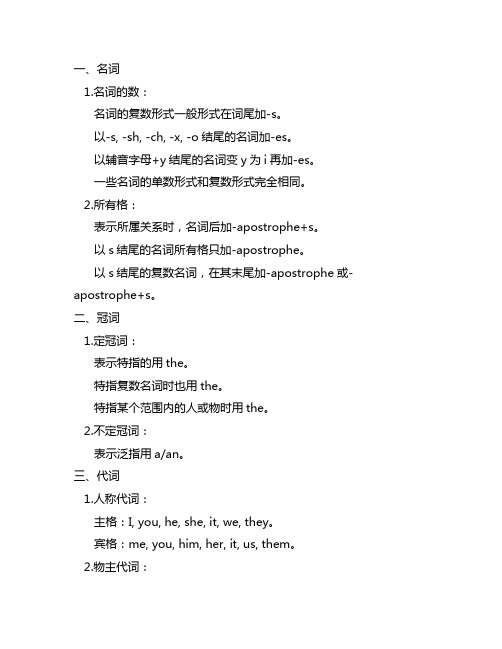
一、名词1.名词的数:名词的复数形式一般形式在词尾加-s。
以-s, -sh, -ch, -x, -o结尾的名词加-es。
以辅音字母+y结尾的名词变y为i再加-es。
一些名词的单数形式和复数形式完全相同。
2.所有格:表示所属关系时,名词后加-apostrophe+s。
以s结尾的名词所有格只加-apostrophe。
以s结尾的复数名词,在其末尾加-apostrophe或-apostrophe+s。
二、冠词1.定冠词:表示特指的用the。
特指复数名词时也用the。
特指某个范围内的人或物时用the。
2.不定冠词:表示泛指用a/an。
三、代词1.人称代词:主格:I, you, he, she, it, we, they。
宾格:me, you, him, her, it, us, them。
2.物主代词:形容词性物主代词:my, your, his, her, its, our, their。
名词性物主代词:mine, yours, his, hers, its, ours, theirs。
3.指示代词:this, that, these, those。
4.不定代词:some, any, no, every, each, many, much, few, little。
四、形容词1.形容词的用法:在名词前作定语。
在系动词之后作表语。
2.比较级和最高级:比较级:比较两者时,用比较级。
最高级:表示三者或三者以上之间的比较。
五、动词1.动词的三单形式:一般情况,动词第三人称单数在末尾加-s。
以辅音字母加y结尾的动词变y为i再加-es。
直接在词尾加-es的动词。
2.动词的现在进行时:am/is/are+动词的现在分词。
3.行为动词的过去式:动词过去式变化规则有规则动词和不规则动词。
六、副词1.副词的用法:修饰动词、形容词、副词。
表示时间、地点、原因、目的等。
2.比较级和最高级:副词比较级和最高级的构成。
七、介词1.介词的基本用法:表示方位、时间、原因、目的等。
新概念英语青少版1B词汇语法知识要点
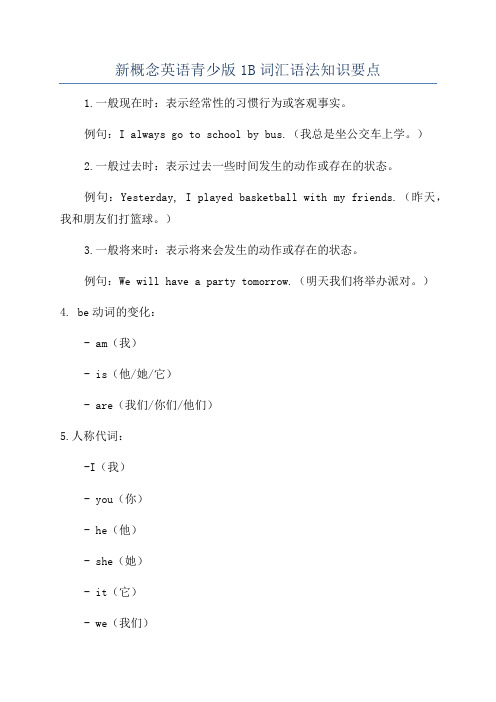
新概念英语青少版1B词汇语法知识要点1.一般现在时:表示经常性的习惯行为或客观事实。
例句:I always go to school by bus.(我总是坐公交车上学。
)2.一般过去时:表示过去一些时间发生的动作或存在的状态。
例句:Yesterday, I played basketball with my friends.(昨天,我和朋友们打篮球。
)3.一般将来时:表示将来会发生的动作或存在的状态。
例句:We will have a party tomorrow.(明天我们将举办派对。
)4. be动词的变化:- am(我)- is(他/她/它)- are(我们/你们/他们)5.人称代词:-I(我)- you(你)- he(他)- she(她)- it(它)- we(我们)- they(他们)6.形容词的比较级和最高级形式:用于比较两个或多个事物的大小或程度。
- 比较级:在形容词前面加上-er,如taller(更高的), faster (更快的)- 最高级:在形容词前面加上-est,如tallest(最高的),fastest(最快的)7.介词:用于表示关系、位置、方向等。
- in(在...内部)- on(在...上面)- under(在...下面)- behind(在...后面)- beside(在...旁边)8.物主代词:用于表示所属关系。
- my(我的)- your(你的)- his(他的)- her(她的)- its(它的)- your(你们的)- their(他们的)9.句子结构:主语+谓语+宾语(SVO)。
例句:My sister likes ice cream.(我的姐姐喜欢冰淇淋。
第一册新概念英语第1-60课语法

第一册新概念英语第1-60课语法代词用法总结典型例句及用法:Ilike basketball.(人称代词的主格做主语)It’s me(表语). /He likes me(宾语).(人称代词的宾格做表语和宾语)Thisis my book. (形容词性物主代词后面必须接名词)Thisbook is mine.(名词性物主代词后面决不可加名词)特殊疑问句特殊疑问句是就句中某一部分提问的疑问句。
它的构成是:特殊疑问词+一般疑问句的结构。
读的时候用降调。
特殊疑问句与一般疑问句的区别在于:特殊疑问句不能够用yes或no来回答,一般疑问句则用yes或no来回答。
比如:What make is it? 它是什么牌子的?回答是:It is Toyota. 它是丰田。
而不能够说:Yes, it is Toyota.常用的特殊疑问词有:疑问代词:what什么,who谁,which哪个人/哪件事,whose谁的,whom谁。
疑问副词:when何时,where何地,why为什么,how如何,how much多少,howmany多少,how long多久,how old多大年纪,how far多远,how big多大疑问形容词:what ,which ,whose+名词Eg: Whois there? 谁在那儿?Whichbook is his? 哪本书是他的?What ishis father? 他父亲是干什么的?Whose bagis that? 那是谁的包?How oldare you? 你多大年纪了?祈使句1. 表命令,请求,叮嘱的句子叫做祈使句。
它通常省略主语,以动词原形直接开头。
Eg:Come with me, please.Stand up,please.Open thewindow, please!2. 祈使句便否定形式是在祈使句的开头加Don’t。
Eg:Don’t talk to me like that.Don’t worry.Don’t swim in the river.3. 祈使句的句前或句末常常加上please,以使语气更加缓和,客气。
最全的新概念英语第一册语法汇总
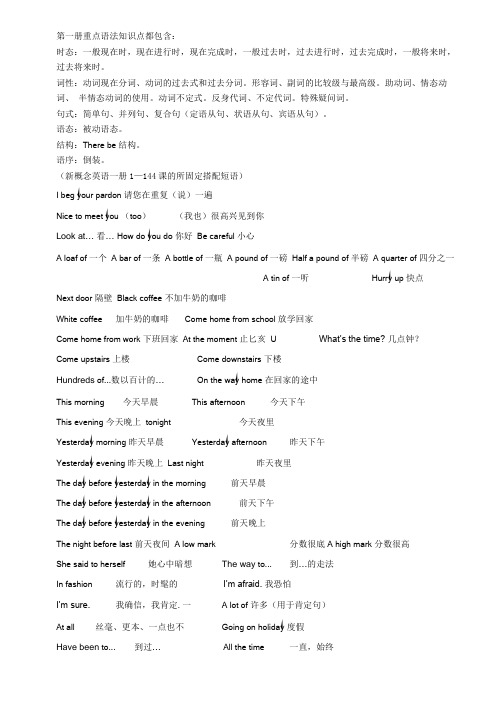
第一册重点语法知识点都包含:时态:一般现在时,现在进行时,现在完成时,一般过去时,过去进行时,过去完成时,一般将来时,过去将来时。
词性:动词现在分词、动词的过去式和过去分词。
形容词、副词的比较级与最高级。
助动词、情态动词、半情态动词的使用。
动词不定式。
反身代词、不定代词。
特殊疑问词。
句式:简单句、并列句、复合句(定语从句、状语从句、宾语从句)。
语态:被动语态。
结构:There be结构。
语序:倒装。
(新概念英语一册1—144课的所固定搭配短语)I beg your pardon 请您在重复(说)一遍Nice to meet you (too)(我也)很高兴见到你Look at… 看… How do you do 你好Be careful 小心A loaf of 一个 A bar of 一条 A bottle of 一瓶 A pound of 一磅Half a pound of 半磅 A quarter of 四分之一A tin of 一听Hurry up 快点Next door 隔壁Black coffee 不加牛奶的咖啡White coffee 加牛奶的咖啡Come home from school放学回家Come home from work 下班回家At the moment 止匕亥U What’s the time? 几点钟?Come upstairs 上楼Come downstairs 下楼Hundreds of...数以百计的…On the way home 在回家的途中This morning 今天早晨This afternoon 今天下午This evening 今天晚上tonight 今天夜里Yesterday morning 昨天早晨Yesterday afternoon 昨天下午Yesterday evening 昨天晚上Last night 昨天夜里The day before yesterday in the morning 前天早晨The day before yesterday in the afternoon 前天下午The day before yesterday in the evening 前天晚上The night before last 前天夜间 A low mark 分数很底A high mark 分数很高She said to herself 她心中暗想The way to... 到…的走法In fashion 流行的,时髦的I’m afraid. 我恐怕I’m sure.我确信,我肯定.一 A lot of 许多(用于肯定句)At all 丝毫、更本、一点也不Going on holiday 度假Have been to... 到过…All the time 一直,始终Have been to…到过…Drive into…撞倒.•・For sale 供出售、出售Have the last word 最后决定、最后才算The R.A.F. 英国皇家空军Return ticket 往返票Next door to... 与..•相邻,在..•隔壁In five hours’time在五小时之后。
新概念英语第一册所有语法点汇总)
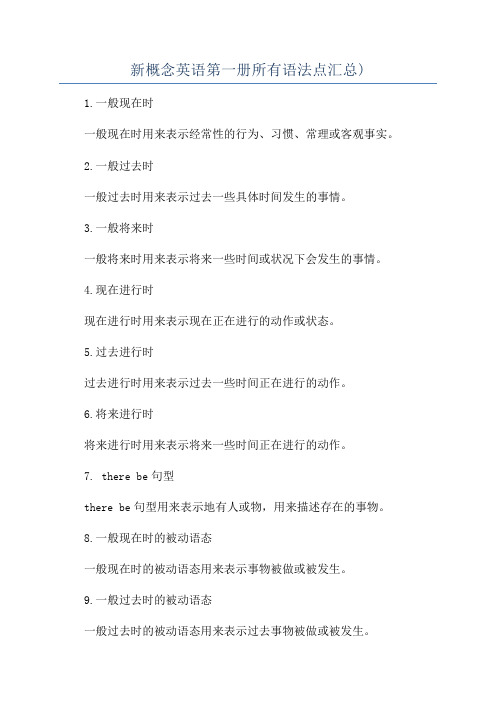
新概念英语第一册所有语法点汇总)1.一般现在时一般现在时用来表示经常性的行为、习惯、常理或客观事实。
2.一般过去时一般过去时用来表示过去一些具体时间发生的事情。
3.一般将来时一般将来时用来表示将来一些时间或状况下会发生的事情。
4.现在进行时现在进行时用来表示现在正在进行的动作或状态。
5.过去进行时过去进行时用来表示过去一些时间正在进行的动作。
6.将来进行时将来进行时用来表示将来一些时间正在进行的动作。
7. there be句型there be句型用来表示地有人或物,用来描述存在的事物。
8.一般现在时的被动语态一般现在时的被动语态用来表示事物被做或被发生。
9.一般过去时的被动语态一般过去时的被动语态用来表示过去事物被做或被发生。
10.一般将来时的被动语态一般将来时的被动语态用来表示将来事物将被做或被发生。
11.现在进行时的被动语态现在进行时的被动语态用来表示事物正在被做或被发生。
12.过去进行时的被动语态过去进行时的被动语态用来表示过去事物正在被做或被发生。
13. do与does的用法do和does用来构成否定句、疑问句和回答。
14.现在完成时现在完成时用来表示过去发生的动作对现在造成的影响或结果。
15.现在完成进行时现在完成进行时用来表示从过去开始一直延续到现在的动作,且这个动作可能还会继续下去。
16.过去完成时过去完成时用来表示过去在一些时间或事件之前已经完成的动作。
17.过去完成进行时过去完成进行时用来表示过去一些时间持续进行的动作,这个动作在另一个过去时间之前已经结束。
18.表示数量的词表示数量的词包括数词、基数词、序数词、分数和百分数等。
19.表示频率的词表示频率的词用来描述件事情发生的频率,如常常、经常、有时、很少、从不等。
20.表示时间的词表示时间的词用来描述一些事件发生的时间,如年、月、日、星期、时、分、秒等。
21.表示地点的词表示地点的词用来描述一些事件发生的地点,如国家、城市、街道、大楼等。
新概念英语一重点单词语法

新概念英语一重点单词语法在新概念英语一中,重点单词和语法是学习者必须掌握的内容。
下面将详细介绍一些重点单词和语法。
一、重点单词1. 人称代词:例如I(我)、you(你)、he(他)、she(她)、it(它)等,它们用于指代不同的人或事物。
2. 动词:动词是句子的核心,表示人或事物的行为、状态或存在。
例如:work(工作)、go(去)、like(喜欢)、think(认为)等。
3. 名词:名词表示人、事物、地点等。
例如:book(书)、pen(笔)、dog(狗)等。
4. 形容词:形容词用来描述名词的特征或状态。
例如:big(大)、small(小)、happy (快乐)等。
5. 副词:副词修饰动词、形容词或其他副词,用来表示程度、方式、时间等。
例如:slowly(慢慢地)、easily(容易地)、often(经常)等。
6. 介词:介词用于连接名词、代词或动词,并在句子中显示它们之间的关系。
例如:in (在)、on(在上面)、from(从)等。
7. 冠词:冠词用于限定名词的范围。
英语中有定冠词"the"和不定冠词"a/an"。
例如:the book(这本书)、a dog(一只狗)。
8. 连词:连词用于连接单词、短语或句子,并在句子中显示它们之间的关系。
例如:and (和)、but(但是)、or(或者)等。
9. 数词:数词表示数量或顺序。
例如:one(一)、two(二)、first(第一)、second (第二)等。
10. 感叹词:感叹词用来表示强烈的情感或反应。
例如:oh(哦)、ah(啊)、wow(哇)等。
11. 代词:代词用于替代名词或名词短语,以避免重复。
例如:he(他)、she(她)、it(它)、that(那个)等。
12. 助动词:助动词用于构成疑问句、否定句、时态等。
例如:be(是)、do(做)、have(有)等。
13. 情态动词:情态动词表示可能、建议、请求等意义。
新概念英语二册语法总结
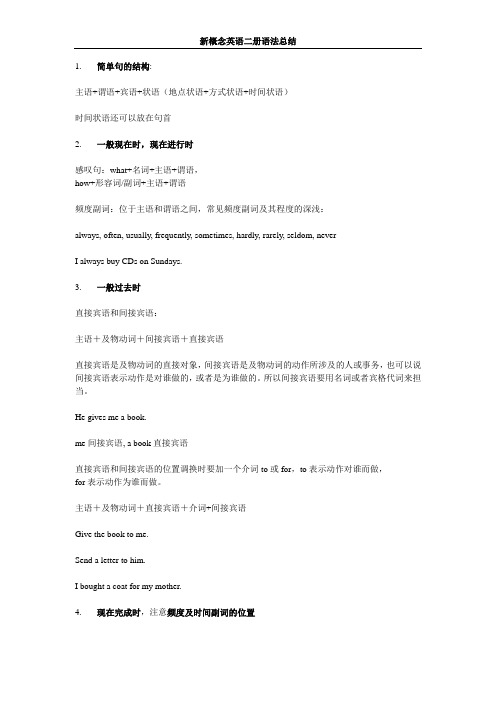
1. 简单句的结构:主语+谓语+宾语+状语(地点状语+方式状语+时间状语)时间状语还可以放在句首2. 一般现在时,现在进行时感叹句:what+名词+主语+谓语,how+形容词/副词+主语+谓语频度副词:位于主语和谓语之间,常见频度副词及其程度的深浅:always, often, usually, frequently, sometimes, hardly, rarely, seldom, neverI always buy CDs on Sundays.3. 一般过去时直接宾语和间接宾语:主语+及物动词+间接宾语+直接宾语直接宾语是及物动词的直接对象,间接宾语是及物动词的动作所涉及的人或事务,也可以说间接宾语表示动作是对谁做的,或者是为谁做的。
所以间接宾语要用名词或者宾格代词来担当。
He gives me a book.me间接宾语, a book直接宾语直接宾语和间接宾语的位置调换时要加一个介词to或for,to表示动作对谁而做,for表示动作为谁而做。
主语+及物动词+直接宾语+介词+间接宾语Give the book to me.Send a letter to him.I bought a coat for my mother.4. 现在完成时,注意频度及时间副词的位置receive/take5. 复习:一般过去时与现在完成时的区别in the way/on the way/in this way/by the way/in a way/get out of my way/Don’t stand in my way./ by the way/no wayspare/to spare6. 冠词用法(一)1).不定冠词用于修饰单数可数名词,当一个单词的第一个发音为元音时要用冠词an, 如果是辅音用a即可。
2).不定冠词还可以用来修饰一类事物,有时候也可以省略:A cat is a lovely animal. Cat is a lovely animal.3).不可数名词加冠词表示一类事物:Apple is a fruit.4).如果特制某人,某物或上文提过的人或物时要用定冠词the5). Some表示一些,可以修饰可数名词及不可数名词。
新概念1 全部语法
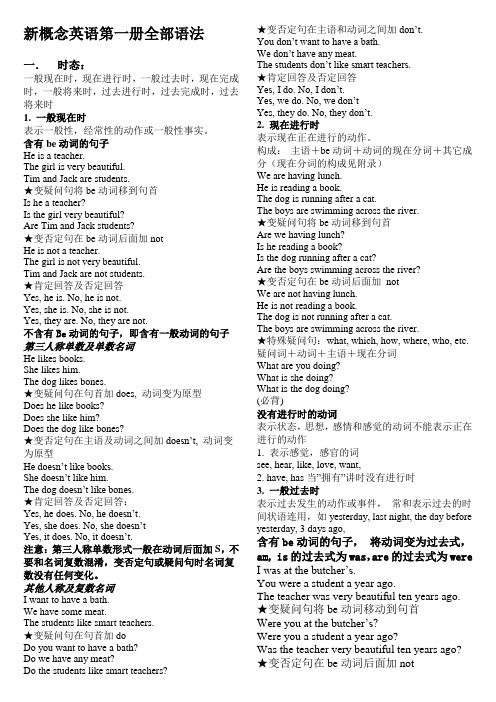
新概念英语第一册全部语法一.时态:一般现在时,现在进行时,一般过去时,现在完成时,一般将来时,过去进行时,过去完成时,过去将来时1. 一般现在时表示一般性,经常性的动作或一般性事实。
含有be动词的句子He is a teacher.The girl is very beautiful.Tim and Jack are students.★变疑问句将be动词移到句首Is he a teacher?Is the girl very beautiful?Are Tim and Jack students?★变否定句在be动词后面加notHe is not a teacher.The girl is not very beautiful.Tim and Jack are not students.★肯定回答及否定回答Yes, he is. No, he is not.Yes, she is. No, she is not.Yes, they are. No, they are not.不含有Be动词的句子,即含有一般动词的句子第三人称单数及单数名词He likes books.She likes him.The dog likes bones.★变疑问句在句首加does, 动词变为原型Does he like books?Does she like him?Does the dog like bones?★变否定句在主语及动词之间加doesn’t, 动词变为原型He doesn’t like books.She doesn’t like him.The dog doesn’t like bones.★肯定回答及否定回答:Yes, he d oes. No, he doesn’t.Yes, she does. No, she doesn’tYes, it does. No, it doesn’t.注意:第三人称单数形式一般在动词后面加S,不要和名词复数混淆,变否定句或疑问句时名词复数没有任何变化。
新概念英语第一册1-72课语法点总结

新概念英语第一册1-72课语法点总结1.物主代词2.人称代词3.Be动词Be动词在一般现在时的三个变形:am, is, areBe动词在一般过去时的两个变形:was,were●注意:Be动词要根据主语的变化而变化。
4.一般疑问句定义:一般疑问句是指可以用Yes或者No回答的句子。
肯定句变为一般疑问句:若一个肯定句中存在Be动词am,is, are,则直接将Be动词提前,结尾加问号。
若一个肯定句中存在情态动词,则直接将情态动词提前,结尾加问号。
若一个肯定句中存在实义动词,则直接在句首加助动词do/does/did,实义动词变原形,结尾加问号。
注意:一般疑问句一般读为升调。
例:Are you a teacher?你是一名老师吗?肯定回答:Yes,I am. 否定回答:No, I am not。
Do you like English? 你喜欢英语吗?肯定回答:Yes, I do。
否定回答:No, I don’t.5.特殊疑问句定义:不能用Yes或者No回答的句子。
构成:特殊疑问词+ 一般疑问句特殊疑问词:what(什么),when(何时),where(何地),who (谁), whom(谁宾格), whose(谁的),which(哪个), why(为什么), how(怎么样)口诀:非常八加一6.不定冠词a/an若单词是以“a, e, i,o”四个元音开头,其前面选用“an”;若单词是以元音字母“u”开头,视情况而定。
若其发音与“umbrella"中的“u"一致,则前面加“an”;若其发音与“university”中的“u"一致(即发字母本身音时),前面加“a”。
若单词是以辅音字母开头,一般前面用a。
特殊:an hour 一个小时;an honest boy 一个诚实的男孩若一个字母单独出现时,分如下情况:加an的字母:a,e, i, o(元音); x,r, s,l,n,f,m, h (辅音;口诀为“学而思送来那份美好”)例:There is an “m” in the word “umbrella”。
(完整版)最全新概念英语第一册语法汇总,文档

时态:大凡现在时,现在进行时,现在完成时,大凡过去时,过去进行时,过去完成时,大凡将来时,过去将来时。
性:在分、的去式和去分。
形容、副的比与最高。
助、情、半情的使用。
不定式。
反身代、不定代。
分外疑。
句式:句、并列句、复合句〔定从句、状从句、从句〕。
:被。
构: There be构。
序:倒装。
〔新看法英一册1-144的所不搭配短〕I beg your pardon 您在重复〔〕一遍Nice to meet you〔too〕〔我也〕很高到你Look at 看⋯⋯ How do you do你好 Be careful小心A loaf of 一个 A bar of 一条 A bottle of 一瓶 A pound of 一磅 Half a pound of 半磅 A quarter of 四分之一 A tin of 一听 Hurry up 快点 Next door 近邻 Black coffee 不加牛奶的咖啡White coffee 加牛奶的咖啡 Come home from school 放学回家Come home from work 下班回家 At the moment 现在 What’ s the time?几点? Come upstairs上楼 Come downstairs下楼Hundreds of 数⋯以百的⋯ On the way home在回家的途中This morning 今天清早 This afternoon 今天下午This evening今天夜晚 tonight 今天夜里Yesterday morning 昨天清早 Yesterday afternoon 昨天下午Yesterday evening昨天夜晚 Last night 昨天夜里The day before yesterday in the morning前天清早The day before yesterday in the afternoon 前天下午The day before yesterday in the evening前天夜晚The night before last 前天夜 A low mark 分数很底 A high mark 分数很高She said to herself她心中暗想 The way to 到⋯⋯的走法In fashion 流行的,髦的I ’ m afraid我恐⋯怕⋯I ’ m sure我⋯确信,我必然⋯ A lot of多〔用于必然句〕At all 毫、更本、一点也不Going on holiday 度假Have been to 到⋯⋯ All the time素来,始Have been to 到⋯⋯ Drive into 撞倒⋯⋯For sale 供销售、销售 Have the last word 最后决定、最后才算英.国皇家空Return ticket 往返票Next door to与⋯相,在⋯近邻In five hours’在time五小此后。
最全的新概念英语第二册语法汇总
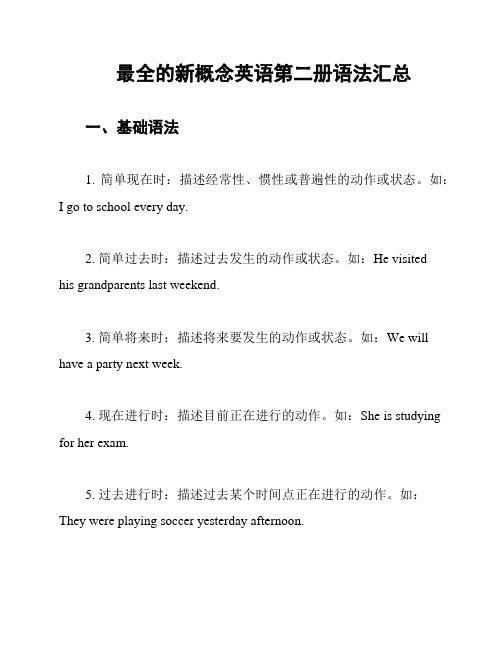
最全的新概念英语第二册语法汇总一、基础语法1. 简单现在时:描述经常性、惯性或普遍性的动作或状态。
如:I go to school every day.2. 简单过去时:描述过去发生的动作或状态。
如:He visitedhis grandparents last weekend.3. 简单将来时:描述将来要发生的动作或状态。
如:We will have a party next week.4. 现在进行时:描述目前正在进行的动作。
如:She is studying for her exam.5. 过去进行时:描述过去某个时间点正在进行的动作。
如:They were playing soccer yesterday afternoon.6. 将来进行时:描述将来某个时间将会进行的动作。
如:I will be working late tonight.二、进阶语法1. 被动语态:表示动作的承受者在句中更重要。
如:The book was written by him.2. 间接引语:重述别人说的话,常常使用动词say、tell等。
如:He said that he was tired.3. 定语从句:用来修饰名词,常以关系代词who、which、that引导。
如:The man who is talking to Mary is my uncle.4. 倒装句:将句子的主语和谓语动词的位置颠倒。
如:Only by working hard can you achieve success.5. 条件句:表示假设、条件或可能性,分为三种类型。
如:If I have time, I will go to the party.6. 反意疑问句:通常由一个肯定句和一个否定短语组成。
如:You like coffee, don't you?三、高级语法2. 主语从句:作为句子的主语,由连词that引导。
新概念语法知识点总结
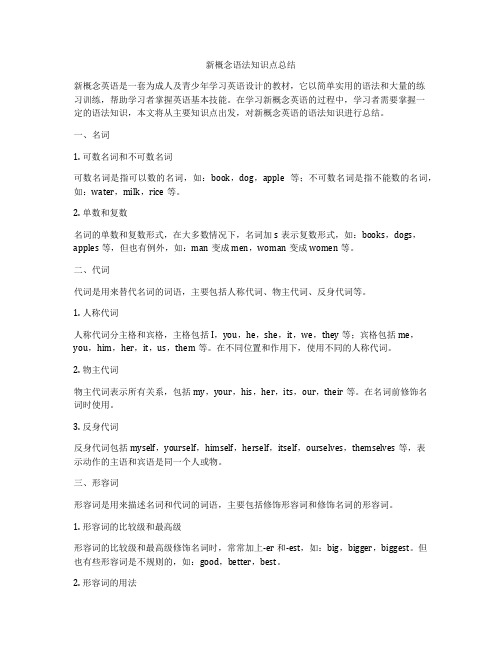
新概念语法知识点总结新概念英语是一套为成人及青少年学习英语设计的教材,它以简单实用的语法和大量的练习训练,帮助学习者掌握英语基本技能。
在学习新概念英语的过程中,学习者需要掌握一定的语法知识,本文将从主要知识点出发,对新概念英语的语法知识进行总结。
一、名词1. 可数名词和不可数名词可数名词是指可以数的名词,如:book,dog,apple等;不可数名词是指不能数的名词,如:water,milk,rice等。
2. 单数和复数名词的单数和复数形式,在大多数情况下,名词加s表示复数形式,如:books,dogs,apples等,但也有例外,如:man变成men,woman变成women等。
二、代词代词是用来替代名词的词语,主要包括人称代词、物主代词、反身代词等。
1. 人称代词人称代词分主格和宾格,主格包括I,you,he,she,it,we,they等;宾格包括me,you,him,her,it,us,them等。
在不同位置和作用下,使用不同的人称代词。
2. 物主代词物主代词表示所有关系,包括my,your,his,her,its,our,their等。
在名词前修饰名词时使用。
3. 反身代词反身代词包括myself,yourself,himself,herself,itself,ourselves,themselves等,表示动作的主语和宾语是同一个人或物。
三、形容词形容词是用来描述名词和代词的词语,主要包括修饰形容词和修饰名词的形容词。
1. 形容词的比较级和最高级形容词的比较级和最高级修饰名词时,常常加上-er和-est,如:big,bigger,biggest。
但也有些形容词是不规则的,如:good,better,best。
2. 形容词的用法形容词可以放在名词的前面修饰名词,也可以放在be动词之后作表语,如:The book is interesting.不定冠词加上形容词的单数形式。
四、副词副词主要用来修饰动词、形容词和其他副词,表示时间、地点、方式或程度等。
- 1、下载文档前请自行甄别文档内容的完整性,平台不提供额外的编辑、内容补充、找答案等附加服务。
- 2、"仅部分预览"的文档,不可在线预览部分如存在完整性等问题,可反馈申请退款(可完整预览的文档不适用该条件!)。
- 3、如文档侵犯您的权益,请联系客服反馈,我们会尽快为您处理(人工客服工作时间:9:00-18:30)。
一、一般现在时(一)be动词的一般现在时一、一般现在时:表示现在或经常发生的动作或状态。
I am a teacher.二、be(arnr is、are)表示状态:①是②在……地方(后面加in、at;大地方用in,小地方用at)This pen is red.They are in BJ.He is at school.He is in the room. (in 在.. 里)三、人称代词主格:代替人或物的词。
只能做主语的人称代词:I我you你he他she她it它We我们you你们they他(她、它)们四、人称代词的宾格:只能放在动词或介词后做宾语的人称代词。
me我you你him他her她it它us我们you你们them他(她、它)们五、形容词性物主代词:后边必须加名词的物主代词。
my我的your你的his他的her她的its它的our我们的your你们的their他(她、它)们的Its leg is broken.六、提示代词this这(这个)that那(那个):加单数可数名词或不可数名词these这些those那些:加复数可数名词七、句子成份主语:动作或状态的发出者谓语:主语发出的动作或状态宾语:主语动作的对象表语:表示主语的位置或状态be动词+表语做谓语She is in my room.I beat him. He is a student.- ..... a—主谓宾主谓八、一般问句:be + 主语+表语九、否定句:主语+ be not礁语十、some一些(用在肯定句中)any一些(用在否定句、问句中)十一、特殊问句:疑问词+ be + 主语+表语练习:1、They are students.What are they?2、This is dirty water.Which is dirty water? (which 那些)What water is this?(名词前的修饰部分在疑问句中仍放在修饰词之后)3、He is in my room.In whose room is he?Where is he?4、They are in that classroom.Who are in that classroom?(当疑问词做主语时要用陈述句语序)In which classroom are they?Where are they?5、This water is dirty.How is this water? (或How about this water?)6、Those arejen books.Where are ten books?How many books are those?7、That is some bread.How much bread is that?8、It is Monday today.What day is it today?(二)实意动词的一般现在时一、实意动词:表示动作的动词二、实意动词的一般现在时:表示现在或经常发生的动作。
三、句子结构:主语+实意动词+宾语+其它They sweep the floor at 6:00 in the afternoon everyday.四、当主语是第三人称单数时:1、一般动词后加s, work—worksHe works for ten hours everyday.2、have hasShe has three brothers and two sisters.3、以s、x、ch、sh 结尾的动词加es, catchy catches以th结尾的动词加s, mouth—mouthsShe catches a cold once a month.4、以y 结尾的动词,y 前为元音时加sHe plays football for three hours everyday.5、以y 结尾的动词,y 前为辅音字母时,去y 加iesHe studies English Chinese and Maths at school.6、以o 结尾的动词加esShe goes to Beijing three times a month.五、否定句:主语+ don't(doesn't)+实意动词原形+宾语+其它六、一般问句:Do(Does) +主语+实意动词原形+宾语+其它练习:变否定句和一般问句1、They sweep the floor at 6:00 in the afternoon everyday.They don’ t sweep the floor at 6:00 in the afternoon everyday.Do they sweep the floor at 6:00 in the afternoon everyday?2、She has three brothers and two sisters.She doesn’ t has three brothers and two sisters.Does she has three brothers and two sisters?或She hasn’ t three brothers and two sisters.Has she three brothers and two sisters?have或has的否定式也可以用haven't或hasn't七、特殊问句:疑问词+do(does)+主语+实意动词原形+宾语+其它练习:1、They sweep the floor at 6:00 in the afternoon everyday.What do they sweep at 6:00 in the afternoon everyday?What time do they sweep the floor in the afternoon everyday?2、He works for ten hours everyday.Who works for ten hours everyday?How long does he work everyday?3、She has three brothers and two sisters.How many brothers and two sisters does she has?4、She catches a cold once a month.How many times a month does she catch a cold?5、He plays football for three hours everyday.For how many hours does he play football everyday?介词后面的名词或代词做介词的宾语。
for表示一段时间6、He studies English Chinese and Math at school.What and Math does he study at school?7、She goes to Beijing three times a month.How often does she go to Beijing?二、Here be 句型一、Here be表示①这(这些)是②给你……③……在这儿呢二、Here be H Here is +①单数可数名词②不可数名词+其它t Here are +复数可数名词+其它三、Here be用法的注意事项1. Here be珞词Here is your pen.Here is some bread.Here are some books.Here is your pen and books.Here are your pens and books.2 .Here+人称代t ^主格+ beHere I am Here you are 三、动词不定式一、动词不定式:to +动词原形,构成动词不定式。
二、作用:可当主语、宾语、表语Your work is to repain ri?。
?? M 修王里 my watch. £ To repair your watch is my work. L want to repair your watch.主 谓 宾 He is in BJ. >―主 谓It is my work to repair your watch.形式主语 It is nice to meet you.形式主语 真主语 It is easy to wash my T-shirt.形式主语 i is nice to meet you.<动词不定式|形式主语谓真主语Here they are She js student.主谓 宾 It is my work主 谓Ji is nice. 表 J! is easy. -------- 主谓真主语真主语四、there be、表示:在.... 地方有....1、「①可数名词单数②不可数名词there is+ \「可数名词单数]r L③1 + +其它there be < 不可数名词」〔there are+①复数可数名词②复数可数名词+其它2、一般问句:be there++§词+地点3、否定句:There be not珞词+地点some一些(用在肯定句中)any一些(用在否定句、问句中)5、特殊问句:疑问词+be there喀词+地点练习:1、There is a pencil-box on your desk.What is there on your desk?2、There is some paper on that table.How much paper is there on that table?On which table is there any paper?3、There is an eraser and three pens in my pencil-box.How many erasers and three pens are there in my pencil-box?In whose pencil-box is there an eraser and three pens?4、There are three cups on that table.How many cups are there on that table?5、There are some cups and a spoon on that table.What and a spoon is there on that table?On which table are there any cups and a spoon?、there be的be going to句型:表示在某地即将有某物2、否定句:there be not going to be名词+地点+其它1、there be(i$ are ) going to be 用词+ 地点+ 其它3、一般问句:be there not going to be珞词+地点+其它4、特殊问句:疑问词+be + there going to be喀词+地点+时间练习:1、There is going to be an apple and two oranges on that table in three minutes.How many apples and two oranges are there going to be on that table in threeminutes?What and two oranges are there going to be on that table in three minutes? On whichtable is there going to be an apple and two oranges in three minutes?In how many minutes is there going go be an apple and two oranges on that table?When is there going to be an apple and two oranges on that table?2、There are going to be two dresses and a coat on my bed tomorrow morning.On whose bed are there going to be two dresses and a coat tomorrow morning?Which morning are there going to be two dresses and a coat on my bed?五、be going to 一、be going to:①表示“即将、将要、打算”干.........................................②必须加动词原形be(am、is、are)二、be going to be表示①即将成为②即将到达某地③即将在某处呆多长时间1、否定句:主语+ be not going to be 俵语+其它2、一般问句:be + 主语+ going to be 磕语+其它3、特殊问句:疑问词+ be + 主语+ going to be +表语+其它练习:1、She is going to be an engineer next week.What is she going to be next week?Which week is she going to be an engineer?When is she going to be an engineer?2、They are going to be in ZJK in two hours. (in 在多长时间之后)Who are going tobe in ZJK in two hours?Where are they going to be in two hours?In how many hours are they going to be in ZJK?When are they going to be in ZJK?3、You are going to be in ZJK for jhree days .(for 表示一段时间)For how manydays are you going to be in ZJK?How long are you going to be in ZJK?4、They are going to be here at 9 oclock.What time are they going to be here?5、They are going to be here on Monday.What day are they going to be here?三、实意动词:表示动作的动词。
